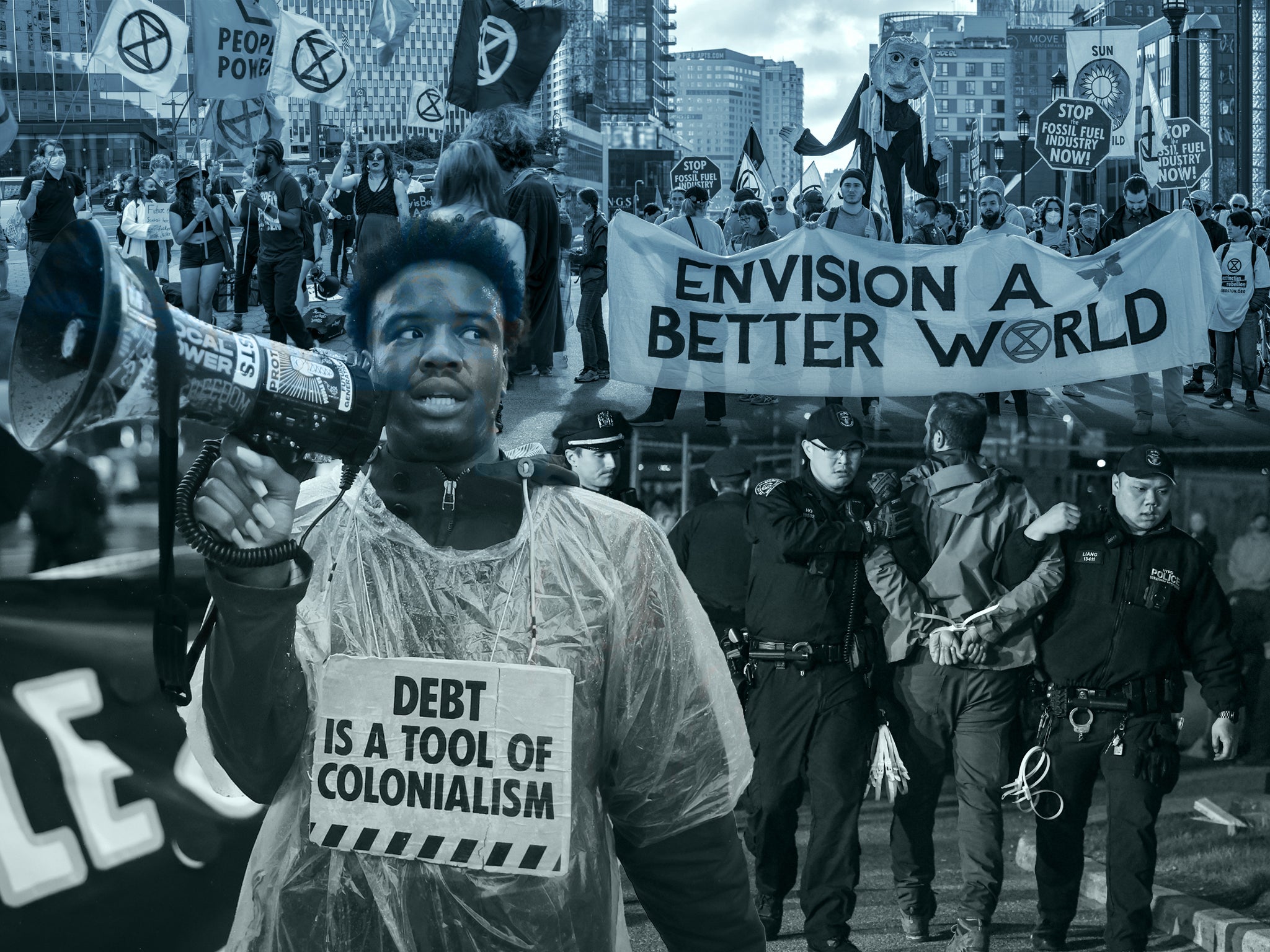As Extinction Rebellion pauses disruptive tactics, what have its climate protests achieved?
Extinction Rebellion burst onto the protest scene in 2018. Can a change in direction revive a plateauing protest movement to meet the moment? Senior climate correspondent Louise Boyle reports


Your support helps us to tell the story
From reproductive rights to climate change to Big Tech, The Independent is on the ground when the story is developing. Whether it's investigating the financials of Elon Musk's pro-Trump PAC or producing our latest documentary, 'The A Word', which shines a light on the American women fighting for reproductive rights, we know how important it is to parse out the facts from the messaging.
At such a critical moment in US history, we need reporters on the ground. Your donation allows us to keep sending journalists to speak to both sides of the story.
The Independent is trusted by Americans across the entire political spectrum. And unlike many other quality news outlets, we choose not to lock Americans out of our reporting and analysis with paywalls. We believe quality journalism should be available to everyone, paid for by those who can afford it.
Your support makes all the difference.On 31st October, 2018, journalist and environmentalist George Monbiot shared a message with his thousands of Twitter followers: “Coming into London on the train now for ExtinctionRebellion. I suspect this is the start of something very big.”
It was a prescient observation. That Halloween, hundreds of people gathered at UK Parliament to protest the government’s failure to tackle the climate crisis under the banner of the fledgling movement, dubbed “XR” for short.
The weeks that followed brought more acts of civil disobedience. Some 6,000 people blocked five London bridges, and protesters super-glued themselves to the gates of Buckingham Palace. More than 80 arrests were made.
The message that humanity was running out of time to avert a planetary-scale catastrophe caught fire. XR groups rapidly multiplied into a leaderless global network with shared principles but distinct, local demands.
The movement reached a crescendo in September 2019 when an array of climate organisations banded together for days of protests, bringing between six and eight million people into the streets across 150 countries.
One early XR victory was forcing the British government to declare “an environment and climate emergency” in May 2019, making the UK the first country to do so.
“That was a huge step because lots of nations and cities followed suit,” Alanna Byrne, media coordinator and activist at Extinction Rebellion UK, told The Independent.
XR waged a campaign of sit-ins and property damage on business and financial institutions, forcing the latter to face up to the role its lending plays in propping up fossil-fuel industries responsible for the majority of planet-heating emissions.
One such effort, in April 2021, saw nine women -- wearing patches which read "better broken windows than broken promises” -- smash the glass fronts of HSBC’s London headquarters before being arrested.
In December, HSBC, the largest UK bank and the seventh largest globally, announced that it would not support new oil and gas projects.

XR targeted media organisations, demanding that they increase and improve their climate coverage. Analysis of nearly 5,000 newspaper articles on climate change, written from 2005-2019 in English-speaking countries, found that 90 per cent accurately represented the issue. Accuracy was found to improve over time except from in right-leaning newspapers like Canada’s National Post, Australia’s Daily Telegraph and Sunday Telegraph, and the UK Daily Mail and Mail on Sunday, researchers noted.
The British government also made a muted attempt to create a Citizens Assembly, an XR demand with the aim of getting the public more deeply involved in climate decision-making. It failed to gain traction and has had limited success. “The [government] completely ignored the outcomes,” Ms Byrne said.
Dr Oscar Berglund, a lecturer in international public and social policy at the University of Bristol who researches climate change activism and Extinction Rebellion, told The Independent that“the assembly isn’t something that people understand.”
“But it’s important to remember what [XR] has achieved,” he said.“The British public are way more concerned about climate change than they were before, that’s a lasting impact. How climate change is talked about in society has changed for the better and there’s much less climate change denialism.”
Three in four people now view climate change as a major threat, according to a 2022 survey of more than 24,000 people across 19 countries by the Pew Research Center.
While the momentum behind large-scale protests stalled during Covid lockdowns, it is slowly returning, suggests the Carnegie Endowment for International Peace’s new climate protest tracker.
But the pandemic years have seen a surge of smaller climate activist groups, frustrated by the lacklustre progress. They favour guerrilla-style actions and attention-grabbing stunts.
Just Stop Oil and Insulate Britain protesters have chained themselves to oil depots and blocked major roads, at times leading to angry confrontations with drivers.
In the US, Declare Emergency blocked Washington DC’s busy Beltway on Fourth of July weekend and activists with Scientists Rebellion, an XR offshoot, chained themselves to a Los Angeles bank. Protesters have shut down Park Avenue in Manhattan, and blocked an airport frequented by private jets and helicopters in the ritzy summer vacation enclave of the Hamptons. In the Netherlands, hundreds of climate activists blocked private jets at Schiphol airport in November.
Climate protesters have added high-end restaurants and ritzy stores to their targets, throwing paint, staging sit-ins and smashing windows. At some of the world’s most prestigious art galleries, mashed potato and soup have been thrown at masterpieces including works by Vincent Van Gogh and Claude Monet (the paintings were undamaged due to protective glass). The Tyre Extinguishers, a group which deflates tyres of gas-guzzling SUVs, have been active in cities from New York to Berlin, Paris and Edinburgh.
That these efforts have generated headlines and debate is without doubt, and there have been measures of success.
Insulate Britain specifically demands that the UK government insulate all social housing by 2025, and creates “legally-binding” plans to make all homes energy-efficient by 2030, to drive down emissions. After the group caused repeated disruption and dozens of activists were arrested, the Chancellor announced in November that a further £6bn would be allocated to insulate home and upgrade boilers.
These more outrageous tactics can normalize climate action more broadly.
“There’s always a radical flank that makes the moderate force look more reasonable,” Noah J. Gordon, acting co-director of the sustainability, climate and geopolitics program at the Carnegie Endowment for International Peace, told The Independent. “Extinction Rebellion started out as a radical group but have become more mainstream as climate politics have become more salient, invidious and urgent, existential even. [XR] will look very moderate I think, if you look back from 2030 or 2040.”

Governments have latched on to the civil disobedience to introduce harsher measures against protest.
The UK’s Conservative government introduced a public order bill criminalizing “disruptive” protest -which includes if they are deemed too noisy.
In the US, Republican-led state legislatures have passed a number of anti-protest laws under the guise of protecting infrastructure, Inside Climate News reported. (The GOP’s rush to criminalize protest also followed Black Lives Matter marches spurred by the murder of George Floyd by a white police officer.)
In December, a top United Nations official expressed deep concern after an Australian climate protester was sentenced to 15 months for temporarily blocking one lane of traffic on the Sydney Harbour Bridge. New laws have been put in place in parts of Australia which climate protesters told The New York Times are aimed at them.
In authoritarian police states, the consequences are even more chilling. Ahead of the Cop27 climate summit in Sharm el-Sheikh this past November, more than 300 anti-government protesters were rounded up and arrested in Egypt.
Yet as democratic norms are quietly dismantled and global emissions continue to soar, the number of people joining climate protests has plateaued.
“The reality is that the climate movement is not growing exponentially,” Ms Byrne told The Independent. “Groups like Insulate Britain and Just Stop Oil have really changed the conversation around public disruption in an amazing way but people aren’t coming out in droves to do that.”
A public faced with overlapping crises of pandemic, war, racial injustice, poverty, and fraying social safety-nets appears to have wearied.
Half the respondents of a recent survey by the Annenberg Public Policy Center at the University of Pennsylvania said disruptive actions like shutting down traffic and targeting paintings decreased their support for efforts to tackle climate change. Only 13 per cent said the actions increased their support.
While 75 per cent of people in the UK are aware of XR, the group is disliked by 41 per cent and popular only with a minority, a YouGov poll found.
The message seems to have resonated. On 1st January, Extinction Rebellion UK announced a temporary shift from public disruption tactics and a focus on “attendance over arrest and relationships over roadblocks”. The group called on 100,000 people to join a mass protest at the Houses of Parliament from 21st April.
XR won’t be giving up civil disobedience entirely, Ms Byrne explained, but plan to “aim disruption at the perpetrators, at government, help people join the dots between the cause and effect”. (Case in point: The offices of Tory minister Michael Gove were doused in black paint this week after his decision to green-light the Cumbrian coal mine).
Its decentralized structure means that a XR group announcement is not a universal edict. For instance, the XR New York chapter released a supportive statement for the UK’s “temporary reorientation in tactics” but said “public disruption must remain in our arsenal...”
Ms Byrne acknowledged that what goes for one, will not be for all.
“We started encouraging our base to put a little less energy in direct action, and spend more time engaging with people in their communities,” she noted, before pointing to the huge unrest across the UK with government policies which has led to strikes from unions of train drivers, nurses, ambulance drivers, teachers and civil servants.
“There’s common ground between these different groups,” Ms Byrne said. “We need to be speaking to trade unions and workers who are going to be at the heart of the [green] transition and create a space that’s more accessible for thousands of people to come together, and become impossible for the government to ignore.”
Notably, XR has not traditionally affiliated itself with left-wing movements or trade unions, Dr Berglund told The Independent, in comparison to groups like Just Stop Oil and Insulate Britain who have been more explict in expressing solidarity.
But XR has evolved before in order to bring more people into the tent. They did so the first time after early criticisms that it was too white and too middle-class, a charge levied at the environmental movement more widely.
Wretched of The Earth, a grassroots collective of Indigenous, Black and Brown people, pointed out in an open letter to XR back in 2019 that its tactic of being arrested, for example, carried disproportionate risk for minority communities. XR responded thanking the group for their feedback with invitations to collaborate, and promising to “reflect and regroup” on strategies and how it conveys its message.
Issues of class are also woven through how the climate battle should be waged. Mr Gordon pointed to the Washington protest on the Fourth of July where one man begged protesters to allow his car through, claiming he was on parole and risked going back to prison if he was late for his job.
“People do not agree about where we’re headed,” he said. “For example - is a new Tube line in London bad because of associated mining and environmental damage? Or is building new green infrastructure the only way we will get anywhere?”
Dr Berglund also noted that building a mass movement is easier said than done. “Nobody has the secret recipe because a lot of it is fluke and circumstance,” he said.
He recalled Chile’s nationwide protests in 2019, which were sparked by high school students’ protest over a bump in Santiago’s subway fares but brought together different groups over wider social inequality. It concluded in the re-writing of the country’s constitution.
He said that centering justice issues and linking up with a wider workers’ struggle could be the key to the wider coalition and dramatic change that XR is pushing for.
“Although there aren’t many winners long-term from climate change,in the short-term, there are people who gain from leaving things as they are,” Dr Berglund said. “Most of us don’t benefit, and we need to group together. The climate fight is also about justice and we need to start there.”




Join our commenting forum
Join thought-provoking conversations, follow other Independent readers and see their replies
Comments